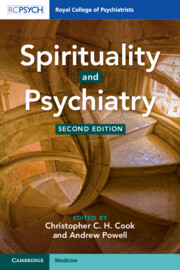Book contents
- Spirituality and Psychiatry
- Spirituality and Psychiatry
- Copyright page
- Contents
- Figures
- Tables
- Boxes
- Contributors
- Foreword to the Second Edition
- Foreword to the First Edition
- Preface to the Second Edition
- Preface to the First Edition
- Acknowledgements
- The Spirituality and Psychiatry Special Interest Group of the Royal College of Psychiatrists: A Personal Reflection
- Chapter 1 Spirituality and Religion in Psychiatry
- Chapter 2 Spiritual Assessment
- Chapter 3 Psychosis
- Chapter 4 Suicide
- Chapter 5 Child and Adolescent Psychiatry
- Chapter 6 Psychotherapy
- Chapter 7 Intellectual Disability
- Chapter 8 Substance Misuse and Addiction
- Chapter 9 Common Mental Disorders
- Chapter 10 Forensic Psychiatry
- Chapter 11 Meditation, Prayer and Healing
- Chapter 12 Religion and Spirituality in the DSM and ICD
- Chapter 13 Spiritual Care in the NHS
- Chapter 14 Spiritual and Religious Interventions
- Chapter 15 The Patient Perspective
- Chapter 16 Religion and Religious Experience
- Chapter 17 Pathological Spirituality
- Chapter 18 Ageing
- Glossary
- Index
- Plate Section (PDF Only)
- References
Chapter 3 - Psychosis
Published online by Cambridge University Press: 07 October 2022
- Spirituality and Psychiatry
- Spirituality and Psychiatry
- Copyright page
- Contents
- Figures
- Tables
- Boxes
- Contributors
- Foreword to the Second Edition
- Foreword to the First Edition
- Preface to the Second Edition
- Preface to the First Edition
- Acknowledgements
- The Spirituality and Psychiatry Special Interest Group of the Royal College of Psychiatrists: A Personal Reflection
- Chapter 1 Spirituality and Religion in Psychiatry
- Chapter 2 Spiritual Assessment
- Chapter 3 Psychosis
- Chapter 4 Suicide
- Chapter 5 Child and Adolescent Psychiatry
- Chapter 6 Psychotherapy
- Chapter 7 Intellectual Disability
- Chapter 8 Substance Misuse and Addiction
- Chapter 9 Common Mental Disorders
- Chapter 10 Forensic Psychiatry
- Chapter 11 Meditation, Prayer and Healing
- Chapter 12 Religion and Spirituality in the DSM and ICD
- Chapter 13 Spiritual Care in the NHS
- Chapter 14 Spiritual and Religious Interventions
- Chapter 15 The Patient Perspective
- Chapter 16 Religion and Religious Experience
- Chapter 17 Pathological Spirituality
- Chapter 18 Ageing
- Glossary
- Index
- Plate Section (PDF Only)
- References
Summary
Psychosis and spirituality are often accompanied by profound and disorienting difficulties with understanding, meaning and purpose. In this chapter the authors draw on their experience as rehabilitation psychiatrists, and their view of spirituality as an essential and integral aspect of being fully human, to explore key interrelationships between spirituality and psychosis in the service of promoting health and healing. Using examples of lived experience they illustrate ways in which the practical application of spiritual perspectives can be important in enabling recovery – from understanding a person’s experience in the context of their personal, religious and cultural background, to re-visioning practice as person-centred care, and from recognising the needs of individual practitioners to service development and cultivating a culture that values peer support. They argue that there is no special or specific ’spiritual’ therapy, but rather that the conscious embodiment of kind, careful and ethical practice upholds spiritual qualities.
- Type
- Chapter
- Information
- Spirituality and Psychiatry , pp. 49 - 70Publisher: Cambridge University PressPrint publication year: 2022



